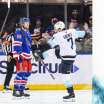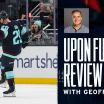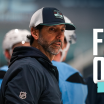There are times when rivals come together rather than oppose. Hockey's most visible evidence of such unity is the traditional handshake line that follows the decisive game of every hard-fought playoff series, when players and fans alike are spent and hoarse from the competition. The handshakes are always captivating and never without palpable currents of emotion.
Fans will have to wait for spring to see this year's version of hockey's postseason ritual. But there is another unified NHL effort to be appreciated and feted this ongoing season. For a decade, National Hockey League teams and its players and coaches have joined to promote mental health awareness through the "Hockey Talks" program.
Break the Stigma
As NHL teams band together to raise awareness about mental health through the 'Hockey Talks' program, Kraken presenting partner Premera can relate
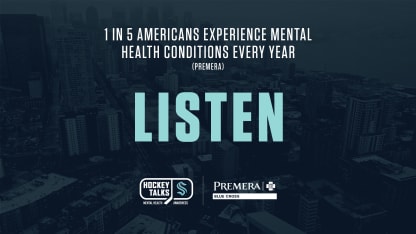
The program was inspired by a former Vancouver Canucks player, Rick Rypien, who experienced depression from a young age and ultimately succumbed when he died in August 2011. The Canucks launched "Hockey Talks" to "not let Rick be forgotten," says Alex Oxenham, senior director of fan and community engagement for the Vancouver franchise.
"Rick wanted to share his story to help other youth who were dealing with the same thing, and he came close to doing so on a couple of occasions," says Oxenham. "It was his goal to reduce the stigma and show kids that even though he had every resource available to him, it was still a battle and nothing to be ashamed of."
In his additional role as executive director of the Canucks for Kids Fund, Oxenham worked with Rypien's family and Rypien's teammate-best friend and former NHL defenseman Kevin Bieksa (now getting rave reviews as a Sportsnet commentator) to donate $50,000 to launch a website designed for youth to help them understand feelings associated with depression and when to ask for help.
Oxenham and the Canucks organization didn't stop there. They reached out to the other six Canada-based NHL teams to create a #BellLetsTalk campaign in the country. Each season, the seven franchises roll out related game presentations, in-market fan activations and player interactions with fans (social media outreach has been particularly effective with younger fans).
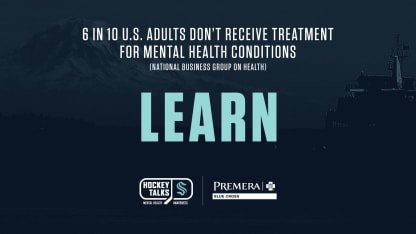
"Some of the other clubs already had a mental health program," says Oxenham. "So we came up with 'Hockey Talks,' an umbrella program similar to 'Hockey Fights Cancer' or 'Hockey is for Everyone.' Each team could design their program to suit their own market - some teams did fundraising, others focused on driving awareness. One of the unique things we did was work together to show our partnership: we compete on the ice, but we're together on addressing the mental health stigma."
How to "break the stigma" is a pursuit shared by Margaret Browne, Pharm. D, who is vice president of healthcare services for Premera Blue Cross, a presenting partner and exclusive health insurance provider for the Kraken. Eighteen months ago, Browne and colleagues launched Premera's "The Power of We" behavioral health campaign for its member companies and their workforces. The health insurance company has since created a
resource website
that is open to any and all visitors.
"We wanted to help people learn the resources available to them," says Browne. "We wanted to get the word out that mental health is as important as physical health. We focused our efforts on awareness for both mental health awareness and substance abuse [including alcohol and opioids]. Even before the pandemic, we were investing in virtual resources so someone can text for support at 2 a.m. or use video conferencing instead of traveling to seek help. People are often afraid of the first step. We want to remove the barriers."
One example: Browne says many high school and college students are struggling with a lack of socialization normally in plentiful supply during school years. The Premera outreach provides app outlets for young people to connect to feelings and emotions that might not be normal for them. It appears to be working for a growing number of teens, in part because texting is familiar and "where they live."
Premera is in position to influence not just consumers and patients, but healthcare providers as well: "We urge the providers [doctors, nurses, therapists, among others] in our network to talk about mental health, do the screenings [asking select questions] to allow patients to share concerns," says Browne.
Another example: Before the 2019-20 season, Vancouver forward Tyler Motte underwent the usual medical exam before training camp. All vital signs and muscular tests checked out. The team doctor posed a final question: "Anything else you have going on, anything else we should be concerned about before camp?"
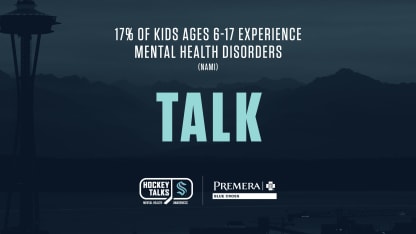
Motte made a split-second decision, then replied: "Actually, earlier in the summer, I was diagnosed with anxiety and depression. Do we have somebody for that?"
Motte's family and girlfriend knew and were supportive, which in an interview with ESPN national hockey writer Emily Kaplan, turned out to give Motte the strength to share his condition with the team physician and, eventually, go public in an effort "to share a bit of my story in hopes of helping others."
Motte, who struggled with depression for several years, has told media members he was in part inspired to speak up for mental health awareness because of a fellow player, goaltender Robin Lehner. In late March 2018, then with the New York Islanders,
Lehner authored a story for The Athletic
about being diagnosed with bipolar disorder, ADHD and post-traumatic stress disorder (PTSD), which went undetected for years during which the now-star Vegas goaltender became addicted to prescription sleeping pills and alcohol.
He eventually entered the NHL and NHL Players' Association substance abuse and behavioral health program. Lehner explained the program is confidential but he revealed his experiences because he wanted and needed the support of teammates, coaches and trainers on a daily basis.
The "Hockey Talks" movement is showing up this month on player social media accounts and will continue its momentum all season. 15 NHL teams are now involved to some measure with three more indicating interest, totaling 18.
Make that at least 19 for the 2021-22 season. The Kraken will be part of the "Hockey Talks" support system and our partner Premera will certainly be informing the team, its players and staff about how to amplify the message that there is no stigma attached to mental health and wellness issues. In fact, we've already started with a primary assist from Premera. Check out our mental health resource guide
here
.



